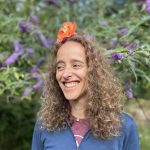
I am a white, cisgender, straight passing, settler who grew up on the ancestral and unceded territory of the Mi’kmaq People (so called Cape Breton Island, Nova Scotia). This territory is covered by the “Treaties of Peace and Friendship” which Mi’kmaq and Wolastoqiyik (Maliseet) people first signed with the British Crown in 1725. The treaties did not deal with surrender of lands and resources but recognized Mi’kmaq and Wolastoqiyik (Maliseet) title and established the rules for what was to be an ongoing relationship between nations. I currently reside on Treaty 3 territory protected under the Dish With One Spoon Wampum Belt Covenant.
I hadn’t thought of becoming a therapist until I met the ideas that inform Narrative Therapy and realized that the projects of social justice and healing were not un-combinable. I had been working in harm reduction when a co-worker encouraged me to attend a workshop on Narrative Therapy. At that first workshop, I remember feeling like I had finally found a language or framework for the ways that I had already been working in community, and a way of working that aligned with values and ethics I cared deeply about. I also recognized an alignment between the philosophy and ethics of harm reduction and Narrative Therapy. A harm reduction philosophy recognizes that our drug laws, which deny people access to a safe drug supply and criminalize people who use drugs (particularly those who are living on the margins because of structural inequalities) are largely responsible for the harms that come to people who use illicit drugs. In this way, a harm reduction philosophy, like narrative therapy, refuses to locate problems inside of people, and takes into account the social and political context that gives rise to problems. It is also similar to a narrative approach, in that it invites people to take a position on the kind of relationship they want to have with the drugs they use, and in so doing, positions them as the experts of their own lives.
After the first narrative therapy workshop that I attended in 2011, I got inspired to learn as much as I could about it, and I sought out employment at a public youth mental health agency (Oolagen) where narrative therapy was taught and practiced. I had the privilege of working there for almost 8 years as an Individual and Family therapist, alongside clinicians who had been practicing narrative therapy for years. Together, we did a lot of learning and un-learning. We questioned taken-for-granted social work practices that I had never before called into question. For example, I had never before thought about why it was that I had not offered my session notes to the people about whom they were written, nor invited their input. I had never before considered whose interests were being served by my complicity in these ‘secret file practices’. I was captivated by the task of listening for the counter stories of resistance embedded in a young person’s response to difficulties they were facing. I loved asking young people what their opinion was, of the opinion or conclusions that people in positions of power had drawn about them. I loved being taught by them what I might have been deprived of understanding about them if I had only known them in the ways they had been ‘storied’ or characterized. It was an incredible honour to work in this environment, alongside co-workers where there was a shared sense of ethics, politics and commitments among us (including management!). And I am forever indebted to the thousands of young people and parents who taught me so much about the skillful and inventive ways they resisted, side-stepped, stood up to, and flat-out refused to go along with problems or difficulties they encountered. How I show up in therapeutic conversations, and in life, is entirely different on account of the thousands of conversations I had the privilege of having while I worked at Oolagen.
What I was drawn to about both Narrative Therapy and harm reduction philosophies are that they do not insist on the depoliticizing of people’s suffering. I was also drawn to their rootedness in social justice. In this way, both harm reduction and narrative therapy have helped me to avoid the individualizing and pathologizing of people’s suffering. I see narrative therapy, not as a technique, but as a worldview, or as a way of being in the world, that assists me as I try to live out my social justice values.
Outside of work, I love checking out art, reading, cuddling with my wonderous mustached cat, taking in live music, spending time with friends and family. I love being outside, and especially love swimming in ponds. I make a yearly trip back to Newfoundland to visit my pals out there. I look forward to the laughs we share, the insider jokes that get produced in a particular kind of company, the good chats we have that open me up to new ways of thinking about things, and the foraging! I return to Toronto every year with my suitcase chalk full of mushrooms and blueberries, and a heart filled to the brim with love and all of the good vibes I filled up on.